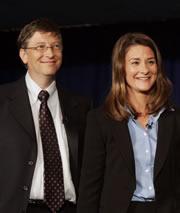 You've heard of Gates — what about Coulter and Welch?Bill and Melinda Gates Foundation
You've heard of Gates — what about Coulter and Welch?Bill and Melinda Gates FoundationIt would be hard, in this day and age, not to know who Bill Gates is. But many other names are not so familiar — often because they started family foundations decades ago, and while their companies have receded or changed names, their money keeps on giving. Here we take a tour through the rich and not-always-famous top donors. For comparisons of amounts given by various foundations in the United States, see the graphs in our philanthropy special.
Arnold Beckman
The company Beckman Instruments Inc. has introduced many novel scientific instruments, including the 'acidimeter' to measure pH of liquids, a rock-smasher for a Mars robot mission, and an electronic shark repeller. Beckman's interest in chemistry was reportedly born by finding a textbook in his family attic, and spurred by classically converting the back shed to a lab during his childhood in the early 1900s. His family's money now goes through a foundation to projects in chemistry and the life sciences.
Steve Bing
Steve Bing is said to have inherited his wealth — a reported $600 million — at age 18. The source of that money is thought to be a family real-estate fortune established by Bing's grandfather, Leo Bing. Aside from art museums and concert halls, Bing's a keen supporter of environmental causes; for example, he was the main financial provider behind Proposition 87, a California statewide initiative that failed to get voted in last year, but which sought to raise $4 billion in oil production tax to help develop alternative fuels.
Richard Branson
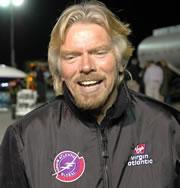 British magnate and adventurer Richard BransonNASA
British magnate and adventurer Richard BransonNASAIt's hard to compete with the British magnate and adventurer in terms of scope. In addition to Virgin airlines and Virgin media, Branson is dabbling in bioethanol refining and space flights. In September last year, Branson said he would invest his personal profits from airlines and a rail company under his control — $3 billion over the next 10 years according to his own estimates — in developing energy sources that don't contribute to global warming. The line between philanthropy and shrewd investment here is a bit blurred.
Eli & Edythe L. Broad
Eli Broad is a renowned business leader who built two Fortune 500 companies from the ground up. The founder-chairman of SunAmerica Inc. has plowed his family money into both the arts and medical research.
Warren Buffett
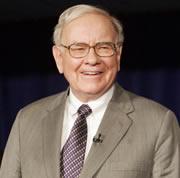 Warren Buffett may go down in history as the man who made the largest gift.Bill and Melinda Gates Foundation
Warren Buffett may go down in history as the man who made the largest gift.Bill and Melinda Gates FoundationBuffett may go down in history as the man who made the largest gift. Having amassed a fortune from astute investments, particularly in the firm Berkshire Hathaway (of which he is the largest shareholder and CEO), he announced that he would give much of it to the Bill and Melinda Gates Foundation. When his donation of about $30 billion was given, it was enough to more than double the size of that foundation. Despite his enormous wealth, Buffett still lives in a relatively modest house that he bought in 1958.
Wallace H. Coulter
Engineer and entrepreneur Coulter invented the Coulter Counter — a device for counting red blood cells. His invention put him into the National Inventor's Hall of Fame, and earned enough cash to dedicate a philanthropic foundation to medical health.
Charles A. Dana
A New York State legislator, industrialist and philanthropist, who has funneled his money into science through a foundation — famously neuroscience. The European Dana Alliance for the Brain is the namesake of this Dana (not, to clarify, the American journalist Charles A. Dana).
William Danforth
Danforth made his money from animal and pet foods, through the St Louis-based Ralston Purina Company in Missouri. His foundation, established in 1927, was devoted to improving St Louis, and in recent years its money goes exclusively to projects in that metropolitan area — home to Monsanto and an agro-biotech hub.
Sherman Fairchild
Fairchild ran an empire with a vast number of interests, from a semiconductor company that played a defining role in the development of Silicon Valley, to Pan American Airlines, of which he was co-founder. Telescopes and various university buildings now bear his name, thanks to his foundation's philanthropy.
Michael J. Fox
Fox, better known to some as Marty McFly (in the Back to the Future trilogy) was forced to retire from full-time acting in 2000 because of worsening symptoms of Parkinson's disease. After going public about his disease in 1998, Fox set up a foundation to help advance Parkinson's disease research, and strongly advocated embryonic stem-cell research. The proceeds of his best-selling memoir Lucky Man have been directed to the foundation.
Bill Gates
The man whose net worth is estimated to be $56 billion kept his place this year in Forbes magazine as the world's richest person — a place he's held for more than a decade. As founder of the software company Microsoft, Gates made his fortune by stoking the personal-computer revolution; Gates is currently chairman of Microsoft and the largest individual shareholder in the company, but dedicates his time to his family foundation . Their donations to charities, cited in some reports as being more than $29 billion since 2000, are said to be sparking a major change in attitude towards philanthropy among the very rich, with giving becoming the norm.
Howard Hughes
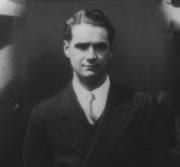 Howard Hughes died alone with a billion estate.Library of Congress
Howard Hughes died alone with a billion estate.Library of CongressThe founder of the Howard Hughes Medical Institute, one of the largest private-funding organizations for biological and medical research in the United States, was blessed with diverse talents: as well as building and racing aeroplanes, and producing the most expensive movie of its time, Hell's Angels, Hughes managed to woo the likes of Katherine Hepburn. But by the time of his death in 1976, Hughes had so shunned public life and been seen by so few people for so long that fingerprints had to be used to identify his body. With no will to consult, more than 400 prospective heirs tried to inherit his estate, estimated at $2 billion. The Hughes Aircraft business ended up in the hands of the Howard Hughes Medical Institute, which sold it to General Motors in 1985 for around $5 billion.
William Myron Keck
You may be familiar with this name because of the Keck telescopes — housed at one of the more famous observatories on the peak of Hawaii's Mauna Kea. But the man who gave $140 million and his name to this facility earned his cash from oil, not astronomy. Keck founded the Superior Oil Company and used its profits to create a philanthropic foundation with assets of more than $1 billion.
The Lilly family
Three members of the family behind the pharmaceutical giant Eli Lilly and Company created an endowment in 1937 to support the causes of religion, education and community development. The endowment, created by gifts in stock, affords special emphasis to projects that benefit young people and promote leadership education and financial self-sufficiency.
John D. and Catherine T. MacArthur
Insurance was the name of the game for John MacArthur, followed by real estate. Their philanthropic foundation works in sustainability and development, and the so-called 'Genius Grant' — the MacArthur Fellowship of $500,000, which goes to individuals who "show exceptional merit and promise". Sadly you cannot apply, but need to be nominated by an anonymous committee.
Gordon Moore
With Moore's leadership, Intel Corporation became the world's largest producer of computer chips. But Moore may be best known as the author of Moore's Law: he predicted — accurately so far — that the power of the silicon chip would double every 2 years, with a proportionate decrease in cost. In 2001, Moore donated $600 million to Caltech, the largest gift ever to an institution of higher education. A year earlier, he and his wife Betty had established the Gordon and Betty Moore Foundation.
David and Lucile Packard
David Packard was co-founder of the huge information technologies Hewlett-Packard Company, famous for scientific calculators, computers, printers and more. He and his wife set up a foundation for giving in 1964.
John Davison Rockefeller
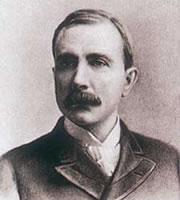 Rockefeller's oil money has gone far.
Rockefeller's oil money has gone far.In the late 1800s, John Davison Rockefeller founded the Standard Oil company, which he ran until he retired. As gasoline grew in importance, his wealth soared and he became the world's richest man and first billionaire. He spent the last 40 years of his life creating the modern systematic approach of targeted philanthropy, creating foundations that had a major impact on medicine, education and scientific research.
Alfred P. Sloan
A businessman who worked his way to presidency of General Motors, Sloan made his money from ball bearings and Cadillacs before turning his cash to a philanthropic foundation. His name is carried by a fellowship programme and business school at the Massachusetts Institute of Technology, his alma mater, and a New York cancer centre.
Cornelius Vander Starr
Starr founded the American International family of insurance and financial services companies, now known as American International Group, Inc. His philanthropic foundation was started in 1955.
Robert A. Welch
Yet another oil man, Welch dedicated his Texas-earned money specifically (and unusually) to chemistry. His foundation supports research and conferences, as well as the Welch Award in Chemistry.
Henry Wellcome
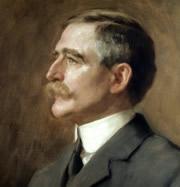 The Wellcome Trust rivals government biomedical funding in the UK.Wellcome Photo Library
The Wellcome Trust rivals government biomedical funding in the UK.Wellcome Photo LibraryIn 1880, Wellcome and Silas Burroughs, both of whom were educated in the United States, set up a pharmaceutical company in the United Kingdom that would take advantage of a new innovation: the compressed medicinal pill. It met with much success. Wellcome died in 1936, and had requested in his will that the profits of his pharmaceutical company be used for medical research. His bequest — whereby trading profits were dedicated to the advancement of knowledge for the benefit of mankind — was the first of its kind in the United Kingdom. The US extension of the Wellcome Trust is called the Burroughs Wellcome Fund.
Visit our newsblog to read and post comments about this story.
